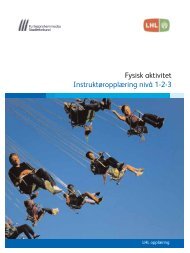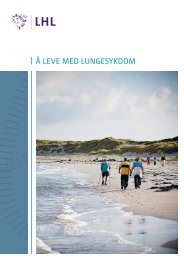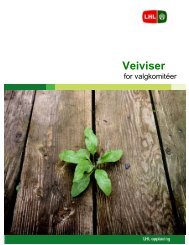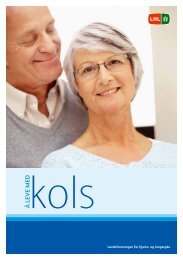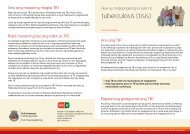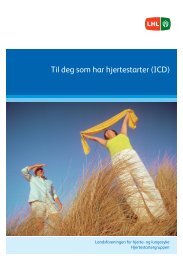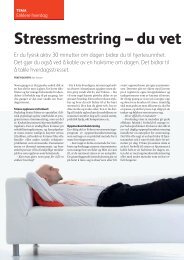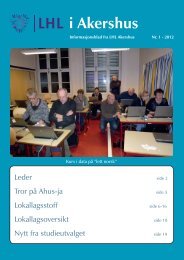You also want an ePaper? Increase the reach of your titles
YUMPU automatically turns print PDFs into web optimized ePapers that Google loves.
<strong>WELCOME</strong> <strong>TO</strong> <strong>THE</strong> <strong>FEIRING</strong> <strong>CLINIC</strong><br />
Visiting hours:<br />
You can receive visitors at any time. You decide when and for how long you wish<br />
to receive visitors.<br />
We are here for you:<br />
You will find a bell pull beside your bed. If you need a nurse, simply pull this<br />
once. The duty room in the surgical department can be reached via the internal<br />
telephone system on either 4200 or 4275. The duty room in the cardiology<br />
department can be reached in the same way on 4100 or 4175<br />
Meal times in the wards: Mealtimes at the hotel:<br />
Breakfast 08.00-09.30 Breakfast 07.00-09.30<br />
Lunch 12.00-13.30 Lunch 12.00-13.30<br />
Dinner 17.00-18.30 Dinner 17.00-18.30<br />
If you are staying at the hotel meals are included in the day rate. Day visitors pay<br />
for meals at the reception desk.<br />
Telephone:<br />
If you wish to place a call from the clinic please dial 0 to get an outside line. Your<br />
calls are registered by the switchboard, and calls must be paid for when checking<br />
out. The room telephones can be used as an internal intercom system between<br />
all hotel rooms and wards. Dial 4 in front of the room number you wish to call.<br />
Internal calls are free.<br />
Mobile telephone:<br />
Mobile phones can be used in most areas in the clinic. The exceptions are<br />
the intensive care ward, monitoring lounge and the waiting room at the heart<br />
laboratory. The patients that have electronic monitoring equipment attached<br />
cannot use mobile phones as these can interfere with the equipment.<br />
Internet:<br />
Please ask at the reception desk if you require Internet access.<br />
Hand hygiene:<br />
A common cause of infection in hospitals is poor hand hygiene. Good hand<br />
hygiene is therefore of great importance to us all. You will find hand cleansing<br />
spirit dispensers in all wards. Please use these!<br />
We wish you a pleasant stay with us!<br />
Best regards from all employees at the Feiring Clinic
TREATMENT WITH MAREVAN<br />
(WARFARIN)<br />
Once your artificial heart valve has been surgically implanted you will be<br />
prescribed MAREVAN. You will be taking the tablets permanently in order to<br />
prevent blood clots (thrombosis) occurring.<br />
How MAREVAN works:<br />
Marevan contains the active ingredient Warfarin. The body needs Vitamin K<br />
in order for the blood to coagulate. The usual sources of Vitamin K are green<br />
vegetables. Some Vitamin K is also stored in intestinal bacteria. Marevan negates<br />
some of the effect of Vitamin K, thus reducing the ability of the blood to clot.<br />
Dosage:<br />
The effect of Marevan varies from person to person. It is therefore necessary to<br />
adapt dosage to the individual patient. This is why you will need to have regular<br />
blood samples taken by your doctor to check if your Marevan dosage needs<br />
adjusting.<br />
The full daily dose of Marevan must be taken at the same time each day, usually in<br />
the evenings.<br />
INR measuring unit for blood clotting ability (INR is an international measuring<br />
unit).<br />
Your INR value should be in the 2.5-3.5.<br />
INR values above 5.0 indicate an increase in the risk of bleeding.<br />
As Marevan reduces the coagulating ability of the blood, bleeding can incur.<br />
The risk of bleeding rises in accordance with higher INR values. If you notice<br />
an abnormal or unusual tendency to bleed in accordance with minor cuts, when<br />
shaving, cleaning your teeth, nosebleeds, beneath the skin (large blue areas where<br />
you have not sustained a blow or injury), you should contact your doctor and have<br />
a new INR value check carried out. Such occurrences of bleeding can indicate<br />
that the effect of your Marevan treatment is too strong, and there may be a<br />
danger of internal haemorrhaging (bleeding). This is extremely rare, but can be<br />
dangerous. Internal haemorrhaging will often show up as blood in urine or black<br />
stools.
Checking your INR:<br />
After the first few weeks with frequent checks to determine your correct Marevan<br />
dose, it will be necessary to check your INR blood value about every 4 weeks –<br />
with shorter intervals if your INR values vary greatly.<br />
You must plan your diet carefully when taking Marevan:<br />
In order to attain the best and most stable results from the treatment, a varied diet<br />
with daily intake of vegetables is required. Some foodstuffs, in particular, green<br />
vegetables, are rich in Vitamin K. Large amounts of Vitamin K can negate the<br />
effect of Marevan. It is therefore best to ensure that you have a regular intake of<br />
vegetables and avoid eating large amounts of vegetables that are rich in Vitamin<br />
K the day before you have you INR test, which would otherwise result in that the<br />
test result showed a falsely low value.<br />
A glass of wine a few times a week is OK, but large volumes of alcohol can<br />
increase your INR value and can represent the risk of bleeding.<br />
Precautions when pulling teeth and minor surgical operations:<br />
Inform the surgeon/doctor/dentist that you are using Marevan. O-operate with<br />
regard to how the Marevan dose shall be dealt with/adjusted in connection with<br />
the planned treatment.<br />
Medicines that may influence the effect of Marevan treatment:<br />
Do not use other medicines without first consulting your doctor. Some medicines<br />
can lessen or increase the effect of Marevan.<br />
Some examples of medicines that can influence the effect of Marevan are:<br />
– Preparations that contain acetyl-salicylic ( Albyl- E, Dispril, Globoid)<br />
– Preparations used to treat pain, arthritis and rheumatism ( Alpoxen, Confortid,<br />
Brexidol, Ibumetin, Indocid, Naproxen, Pirox, Ibux and so forth)<br />
Pain relief products that contain Paracetamol, for example Pamol, Panodil,<br />
Paracet and Pinex can be taken, but not more than 14 days in one week. If you<br />
exceed this dose there is a risk of bleeding incurring.
BE KIND <strong>TO</strong> YOUR HEART – A FEW RULES<br />
The treatment you have received has repaired the damage caused by your illness, but<br />
the treatment has not dealt with the cause of your heart problem. Genetically inherited<br />
problems can’t be dealt with, but there are a number of things you can do by assuming<br />
responsibility for your behaviour and habits to reduce risk factors. Many people find it<br />
difficult to start down this path. We have therefore included some advice and tips to get<br />
you on your way to a healthier lifestyle.<br />
Stop smoking<br />
– Smoking is one of the key risk factors that cause cardio-vascular diseases. Smokers are<br />
2-3 times more exposed to the risk of cardiovascular disease than non-smokers.<br />
– Smoking has a negative effect on the composition of fatty acids in the bloodstream<br />
and reduces the concentration of beneficial cholesterol while increasing the amount of<br />
undesirable cholesterol.<br />
– An unfavourable composition of fatty acids in the blood results in thicker fatty deposits<br />
in the veins and arteries and accelerates the process of arteriosclerosis.<br />
– Tobacco contains a number of elements and compounds that can damage blood vessel<br />
walls and further aggravate the process of arteriosclerosis.<br />
– Tobacco smoke makes platelets stickier and increases the tendency for the plates to<br />
stick together, which in turn increases the risk of thrombosis.<br />
– If you stop smoking the beneficial cholesterol will quickly increase, and the risk of<br />
cardiovascular disease incurring will be halved within one year.<br />
– After only five years the risk of dying due to a heart attack will be the same as for a<br />
non-smoker.<br />
Good advice on how to stop smoking:<br />
– Take your time in building up your motivation.<br />
– Choose a date when you will stop smoking.<br />
– If possible, stop smoking together with a relative or friend.<br />
– Make a list of the advantages and disadvantages of stopping smoking.<br />
– Cut down on the number of cigarettes you smoke daily as you approach your<br />
stop date.<br />
– Change your smoking habits; smoke at other times and in other places.<br />
– Make a plan for what to do when the craving for tobacco comes.<br />
– Recruit support from your family, friends and colleagues.<br />
– Take it one day at a time. Remember to reward yourself!<br />
– Various aids containing nicotine as substitutes for tobacco are available at many<br />
stores and all chemist shops. These include chewing gum, plasters, tablets and<br />
inhalers.<br />
– You will probably find, as do most people, that your doctor is you most<br />
important ally. He or she will be able to provide you with aids and medicines that<br />
will dampen the craving for nicotine and make it easier to stop smoking.<br />
– Join a stop-smoking course. There are also a number of Internet-based follow<br />
up sites.<br />
– Call Røyketelefonen (The Smoker’s Phone), 800 400 85. Experts on how to stop<br />
smoking will be able to provide you with excellent advice.
Healthy food – good for the heart:<br />
<strong>LHL</strong>’s six tips on healthy eating:<br />
– Regular but small meals<br />
– Energy balance<br />
– Be aware of what you eat<br />
– Eat colour!<br />
– Drink plenty of water<br />
– Use less salt<br />
Regular meals, small portions<br />
We recommend five or six meals during the course of the day, with four main<br />
meals and one or two snacks in between. Avoid nibbling in between.<br />
This pattern of mealtimes will help to control your appetite and metabolism as<br />
well as helping you to eat less. Moreover, smaller, regular and healthier meals<br />
means that your diet will be more varied and your body will take up nutrients more<br />
easily, which in turn will improve your digestion.<br />
Regular but small meals give you:<br />
– A regular supply of energy<br />
– A stable glucose level<br />
– Reduced feeling of hunger<br />
– Improved metabolism<br />
– Helps preventing nibbling<br />
How to do it:<br />
The ideal is to take meals at regular times daily.<br />
A good example of a fixed meal schedule is:<br />
Breakfast<br />
Light snack<br />
Lunch<br />
Light snack<br />
Dinner<br />
Supper
Planning advice:<br />
– Write down weekly meal schedules and use these as shopping lists<br />
– Have the ingredients ready when you come home<br />
– Don’t go shopping when you are hungry<br />
– Drink water and have a light snack just before you leave work<br />
Work out a routine that suits you. It’s important to remember that meals should<br />
be taken every three to four hours. The maximum time between supper and<br />
breakfast should be twelve hours.<br />
Energy balance<br />
That your body has the proper energy balance means that your intake of energy<br />
is the same as your energy consumption. The energy in the food we eat and drink<br />
during one day must not be greater than the amount if energy we use during<br />
the same day. A person with the proper energy balance has a better chance of<br />
attaining and maintaining stable body weight.<br />
Losing weight<br />
In order to lose weight your energy intake must be less than your energy<br />
consumption. This can be achieved by for example changing your diet and<br />
increasing your level of activity.<br />
There are two main types of fat: saturated and unsaturated<br />
Saturated fats are animal fats and we should eat less of these. Saturated fats are<br />
found in homogenised milk, fatty cheeses, hard margarine, butter, cream and<br />
products made from these, and also in processed, fatty meat products.<br />
Unsaturated fats are found in soft vegetable margarines, plan oil (rapeseed, olive,<br />
sunflower) grain cereals and coarse cereal products, nuts, oily fish and products<br />
made from these such as herring, mackerel, sardines, trout, salmon and eels.<br />
Tips:<br />
– Eat less fat and oils, in particular saturated fats.<br />
– Replace some saturated fats with unsaturated<br />
– Reduce the volume of fat from sandwich fillings, try having one slice of bread<br />
with cheese and one with fish instead of two with cheese.
Think before you eat<br />
Make sure that your choice of food is the result of careful thought - don’t let your<br />
feelings tae control. Enjoy each mouthful. Stop eating when you no longer feel<br />
hungry. It’s important not to rush meals.<br />
Are you eating too much and too fast?<br />
It takes a while for the feeling of hunger to dissipate. This is why you risk eating<br />
too much if you eat too fast. Eat slowly. Wait a while before taking a second<br />
helping. Kiosk food and other fast foods are often eaten faster than home cooked<br />
meals, and are less satisfying.<br />
How large portions do you eat?<br />
The dinner plate model is a good guide.<br />
One dinner should be made up as follows:<br />
¼ meat or fish<br />
¼ potatoes, rice or pasta<br />
½ vegetables or green salads<br />
Tips:<br />
If you are still hungry, just take some more vegetables or salad.<br />
Food on the move<br />
Healthy food is not necessarily boring. All you have to do is think tactically when<br />
you are at the counter and making you choice<br />
– You can choose chicken instead of hamburger or hot dogs.<br />
– Why not fresh fruit instead of chocolate?<br />
– Choose a diet soft drink or water to.<br />
– A bun with your coffee is healthier than a muffin or Danish pastry.
Cholesterol<br />
A high cholesterol level in your blood is not a disease, but the higher your<br />
level is the greater the risk for cardiovascular disease incurring. Dairy and meat<br />
products contain high levels of saturated fats and are often high in cholesterol.<br />
Egg yolk and offal (including roe and caviar) are also high in cholesterol. Your<br />
consumption of eggs should not be more than 3-4 per week, including those you<br />
use in preparing other foods. Eating less saturated fat is more important than the<br />
amount of cholesterol contained in individual foods. A fibre-rich diet with coarse<br />
grain products, legumes, fruit and vegetables/green salads also has a positive<br />
effect on cholesterol.<br />
“He who feasts each day, never has a good meal<br />
– Thomas Fuller, English physician and author (1645-1734)<br />
Eat colour<br />
Eat more fruit and vegetables. At least two helpings of vegetables and two fruits<br />
daily – preferably more.<br />
Fruit and vegetables help to prevent amongst other ailments cardiovascular<br />
diseases. Vegetables provide better protection than fruit. Frozen vegetables are<br />
just as good as fresh.<br />
How to get your five a day<br />
– Fruit/juice with breakfast for example two kiwis<br />
– Fruit/vegetables with lunch for example two carrots<br />
– Vegetables with dinner for example 2 potatoes and 2 dl boiled/steamed<br />
vegetables<br />
– One vegetable and a piece of fruit as a light snack for example a glass of juice<br />
Tips:<br />
Include vegetables or a green salad with all meals and fruit as light snacks. Green<br />
salads should include lots of dark green vegetables such as Ruccola, Cabbage,<br />
Spinach and Broccoli. These vegetables are rich in antioxidants.
Fibre<br />
Foods containing plenty of fibre such as wholemeal breads, oats, mixed cereals,<br />
beans, lentils and pulses, fruit, vegetables and potatoes are the basis of a change of<br />
diet. These foodstuffs are free from cholesterol, have a high fibre content, vitamins<br />
and minerals. They also taste good and satisfy hunger. Fibre helps to regulate your<br />
digestive system. Fibre also has a preventive effect against amongst other things<br />
constipation.<br />
Nuts<br />
Nuts are a complete foodstuff, and contain many nutrients that are good for you.<br />
Nuts contain antioxidants that protect the body cells and can reduce the risk of<br />
many illnesses. Nuts are however rich in calories, so limit your intake.<br />
Tips:<br />
Eat nuts and dried fruits as a light snack, but don’t eat too much.<br />
Drink enough water<br />
Your body depends on water to function properly. Water is necessary for your<br />
body to extract nutrients from food and transport these to the cells. Your body<br />
needs 2 to 3 litres of fluids daily. Some of this will extracted from your food, but<br />
the rest must be taken separately. We recommend that you drink 1 to 2 litres of<br />
water daily.<br />
Water fills the stomach. Take a glass of water before meals.<br />
Tips:<br />
Drink before you feel thirsty<br />
Make it a habit to have a bottle or jug of water handy at home or at work<br />
Always take a bottle of water with you in your bag or backpack. Add a little zest by<br />
putting a slice of orange, lemon or lime in the water.<br />
Cola, coffee, tea and alcohol contain caffeine and are diuretics. If you drink large<br />
volumes of these beverages you should drink extra water in order to regain your<br />
fluid balance.<br />
You will know when you are drinking enough water when your urine is light and<br />
transparent.
Use less salt<br />
The function of salt in the body<br />
Salt is vital to all of us. It is of major import to amongst other things fluid<br />
balance, nerves and muscles.<br />
An excess of salt binds water in the body and can result in high blood pressure.<br />
Reducing the amount of salt in your diet can be beneficial in reducing your blood<br />
pressure. High blood pressure is one of the major risk factors for cardiovascular<br />
diseases.<br />
The following will help you to reduce your salt consumption:<br />
– Prepare your food by boiling, steaming, roasting, roasting in foil or in the<br />
microwave.<br />
– Use fresh and dried herbs instead of salt, but take with mixed spices/herbs that<br />
may have salt added.<br />
– Use mineral salt, but do not use double the amount.<br />
– Bake your own bread.<br />
– Eat only moderate amounts of cheese.<br />
– Limit your consumption of crisps, chips, salted peanuts and similar, choose<br />
unsalted nuts.<br />
– Limit the use of bullion powder, Soy sauce, dried food mixes and fast food.
Use your body - exercise regularly<br />
Why you should exercise<br />
– Regular physical activity reduces the risk of cardiovascular disease.<br />
– The favourable cholesterol in your blood increase.<br />
– Reduces the risk of thrombosis<br />
– Increase your metabolism rate<br />
– Helps to reduce high blood pressure<br />
– Reduces stress levels<br />
– Increase your ability to work and improves your general health<br />
Starting a new exercise regime:<br />
– Start by talking short walks at an easy pace, increasing both tempo and distance<br />
over a period.<br />
– Choose activities you like, this will help motivate you and increase your chances<br />
of success.<br />
– It’s easier to start if you exercise with friends or join in organised activities.<br />
– Don’t set yourself an impossible target from day one, start off with a lower<br />
ambition and aim higher as you make progress.<br />
How much exercise and when:<br />
– Keep in mind that exercise should leave you warm and perspiring<br />
– The ideal schedule is at least 30 minutes daily, but 45 minutes 3 days a week is<br />
fine as well<br />
– Try to get some physical activity in your daily life as well (gardening, take the<br />
stairs instead of the lift, walk instead of driving and cut down on time in front of<br />
the TV)<br />
– Regular, all year round exercise gives a much better result than short periods of<br />
high activity.
Some tips about exercise<br />
Activities that improve your general physical condition are favourable (walking,<br />
jogging, cycling, skiing, swimming etc.)<br />
Interval training (repetitions) improves your general health and is particular good<br />
for your heart. (For example: “4-4 training” After warming up you increase the<br />
tempo to 80-90% of your maximum for 4 minutes and repeat this at least 4 times)<br />
Training with weights is also beneficial. Enlist help in designing a programme to<br />
suit your needs and ability<br />
Good running shoes are vital in order to avoid load injuries. Enlist help in finding<br />
shoes that fit you properly and suit the types of activities you intend to start with<br />
Your body needs to warm up for 10-15 minutes. Start at an easy pace and increase<br />
your tempo as you start warming up. Reduce the tempo during the final 5 minutes.<br />
It’s never too late to start regular exercise!
Stress<br />
What is stress:<br />
Stress is the body’s natural reaction to the loads imposed on it, on the basis of<br />
how we as individuals interpret any given situation emotionally or cognitively.<br />
How and the degree to which the body reacts is dependent on this interpretation,<br />
thus influencing the body’s response in the form of physiological reactions. When<br />
are able to initiate measures to regulate our stress levels stress is not harmful. If<br />
on the other time we fail –especially for long periods – we are unable to control<br />
our stress levels the effects of this will be damaging because the result will be:<br />
– High blood pressure<br />
– Faster pulse<br />
– Increase in glucose levels<br />
– The volume of fatty acids in the blood increases<br />
– Blood becomes “thicker”<br />
– Poor indigestion<br />
– Muscles become tense<br />
Which is why we know that there is a definite link between stress and<br />
cardiovascular diseases.<br />
Most people think that stress is something that only arises in connection with<br />
work situations, but this is not true. Stress can just as easily arise in leisure<br />
situations and in domestic situations, for example in the form of matrimonial or<br />
other family problems, financial problems and not least health. Having or having<br />
experienced heart disease can be such a factor.<br />
Tips that help to reduce stress:<br />
– Focus on a healthy and nutritious diet<br />
– Take time out to rest and relax while you find yourself in a stressful situation –<br />
and not least in your everyday activities.<br />
– Make sure you get regular physical exercise. Physical activities help to combat<br />
the destructive effects of stress.<br />
– Sleep is important. If you find that you are unable to get sleep properly without<br />
constantly waking you should seek advice from someone who can advise you, for<br />
example your regular doctor.<br />
– Arrange your life so that there is a good balance between family, work and<br />
leisure.<br />
– Set yourself realistic targets. Learn your limitations and aim accordingly.<br />
– Sort out, prioritise and delegate. Practice saying no.<br />
– Keeping your feelings and emotions locked in can easily become a stress factor.<br />
Release the pressure. Say what you mean and feel.<br />
If there’s no one in your social circle you feel you can talk openly to, contact your<br />
doctor, a voluntary help centre, <strong>LHL</strong>-groups or similar where you will be able to<br />
talk to professionals or others with the same thoughts and experiences as you.
Ordliste<br />
Aktivitet<br />
Akutt hjerteinfarkt<br />
Alkohol<br />
Ambulanse<br />
Antikoagualsjon<br />
Arm<br />
Arterie<br />
Arv<br />
Aterosklerose<br />
Atrieflimmer<br />
Avføring<br />
Bandasjer<br />
Betennelse<br />
Ben<br />
Bevege<br />
Bivirkning<br />
Blodprøver<br />
Blodsukker<br />
Blodtrykk<br />
Blodåre<br />
Blødning<br />
Blåse<br />
Bryst<br />
Brystsmerter<br />
Buss<br />
Diabetes<br />
Dren<br />
Drikke<br />
Dusje<br />
EKG<br />
Familie<br />
Fatle<br />
Feber<br />
Fly<br />
Fløyte<br />
Dictionary<br />
Activity<br />
Acute heart failure<br />
Alcohol<br />
Ambulance<br />
Anti coagulation (using Anti coagulant)<br />
Arm<br />
Artery<br />
Inheritance, inherited. Hereditary<br />
disease<br />
Arterioscleroses<br />
Lone fibrillation<br />
Defecation, bowl movement, faeces<br />
Bandage, bandages, bandaging, (also<br />
dressing)<br />
Infection<br />
Bone, leg<br />
Move, movement<br />
Side effects<br />
Blood samples, blood tests<br />
Blood sugar<br />
Blood pressure<br />
Veins<br />
Bleeding<br />
Blow<br />
Breast, chest, chest area<br />
Chest pains<br />
Bus<br />
Diabetes<br />
Drain, drain tube<br />
Drink<br />
Shower<br />
ECG (Electrocardiogram)<br />
Family<br />
Sling<br />
Fever<br />
Fly, Aircraft, Plane<br />
Whistle (Music: Flute)<br />
Forebygge<br />
Frokost<br />
Fysioterapeut<br />
Gå<br />
Hjerneslag<br />
Hjerteinfarkt<br />
Hjerteklaffer<br />
Hjertekrampe<br />
Hjerteovervåkning<br />
Hjerterytme<br />
Hjertestans<br />
Hjertesvikt<br />
Hjertet<br />
Hode<br />
Hoste<br />
Hotell<br />
Hvile<br />
Informasjon<br />
Insulin<br />
Intensiv<br />
Ja<br />
Kaffe<br />
Kald<br />
Kiosk<br />
Klokke<br />
Kolesterol<br />
Komplikasjoner<br />
Kone<br />
Kosthold<br />
Koronar angiografi<br />
Kvalme<br />
Kvinne<br />
Lege<br />
Ligge<br />
Prevent, prevention, preventive care<br />
Breakfast<br />
Physiotherapist<br />
Walk, leave<br />
Embolia cerebri, progessing stroke,<br />
stroke<br />
Thrombosis, cardiac infarction<br />
Heart valves<br />
Angina pectoris<br />
Heart monitoring<br />
Heart rhythm<br />
Cardiac arrest<br />
Heart failure<br />
The heart<br />
The head<br />
Cough<br />
Hotel<br />
Rest<br />
Information<br />
Insulin<br />
Intensive<br />
Yes<br />
Coffee<br />
Cold<br />
Kiosk<br />
Clock,<br />
Cholesterol<br />
Complications<br />
Wife<br />
Diet (as in food regimen)<br />
Coronary angiography<br />
Sick, feeling unwell, feeling sick<br />
Woman<br />
Doctor, physician (one who operates:<br />
surgeon)<br />
Lie, lay down
Lunsj<br />
Mage<br />
Mann<br />
Mat<br />
Medisiner<br />
Middag<br />
Mobiltelefon<br />
Mosjonere<br />
Motivere<br />
Nei<br />
Operasjon<br />
Overvekt<br />
Pacemaker<br />
Psykisk<br />
Puls<br />
Pusse tenner<br />
Pute<br />
Pårørende<br />
Reise hjem<br />
Risikofaktorer<br />
Rullestol<br />
Rygg<br />
Rytmeforstyrrelser<br />
Røntgen<br />
Røyking<br />
Saft<br />
Sekretær<br />
Seksualitet<br />
Seng<br />
Sitte<br />
Skuldre<br />
Slim<br />
Sliten<br />
Smerter<br />
Smertestillende<br />
Sove<br />
Spisesal<br />
Stol<br />
Stress<br />
Strømpe<br />
Lunch<br />
Stomach<br />
Man<br />
Food<br />
Medicines<br />
Dinner<br />
Mobile telephone, USA: Cell phone<br />
Exercise<br />
Motivate<br />
No<br />
Operation<br />
Overweight (extreme: obese)<br />
Pacemaker<br />
Mental<br />
Pulse<br />
Clean or brush teeth<br />
Pillow, also cushion<br />
Next of kin<br />
Travel home, go home<br />
Risk factors<br />
Wheel chair<br />
Back<br />
Atrial tachycardia (check with specialist)<br />
Roentgen, also X-ray<br />
Smoking<br />
Fruit juice<br />
Secretary<br />
Sexuality<br />
Bed<br />
Sit<br />
Shoulders<br />
Slim<br />
Tired, as in exhausted<br />
Pain<br />
Pain relieving medicine<br />
Sleep<br />
Dining room<br />
Chair<br />
Stress<br />
Stocking<br />
Sykehus<br />
Sykepleier<br />
Sår<br />
Taxi<br />
Te<br />
Telefon<br />
Temperatur<br />
Tisse<br />
Tolk<br />
Trene<br />
Trøtt<br />
Ultralyd<br />
Undersøkelse<br />
Uregelmessig hjerterytme<br />
Urinkateter<br />
Vann<br />
Varm<br />
Vaske<br />
Vaske hender<br />
Vente<br />
Veneflon<br />
Hospital<br />
Nurse<br />
Wound, graze, cut, flesh trauma<br />
Taxi<br />
Tee<br />
Telephone<br />
Temperature<br />
Urinate Child speak: wee-wee, tiddle<br />
Interpreter<br />
Train (train up muscles, condition<br />
through exercise)<br />
Tired<br />
Ultrasound<br />
Examination<br />
Irregular heartbeat or heart rhythm<br />
Urine catheter<br />
Water<br />
Warm, hot, running a temperature<br />
Wash, cleanse<br />
Wash hands<br />
Wait<br />
Veneflon



